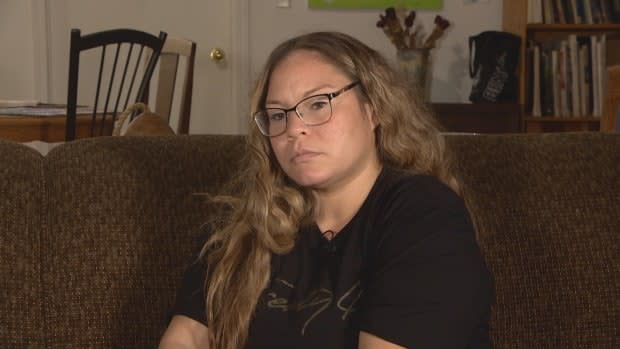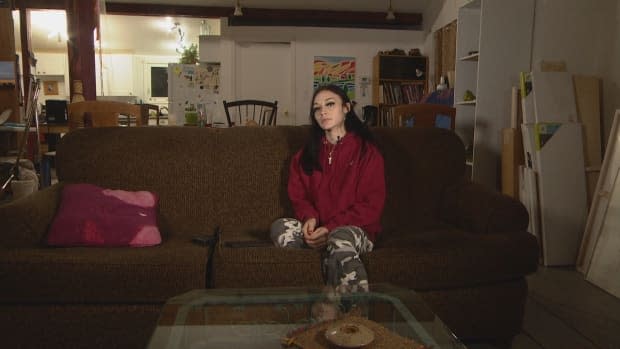Advocates say a lack of adequate supports is driving rampant evictions in Sask.

Larissa Sellers, a single mother of three, was evicted from her Regina apartment on Nov. 9.
The 35-year-old is now staying with family, with her kids split between relatives, and is struggling to find an affordable place to live.
"I'm getting down to the point where I have to decide whether I'm going to buy groceries this month or pay rent. It's getting really bad," she said.
"There were times I didn't pay rent on time, or was out of town for work and didn't have cell service to make the payments."
Sellers is just one of may people who have been evicted in Saskatchewan this year.
The Office of Residential Tenancies (ORT), which holds possession hearings between landlords and tenants on evictions, said that from April 1 to Aug. 31, it received 2,093 applications from landlords looking to evict tenants. ORT said 48 per cent of those, or 996, resulted in an eviction being granted.
Sellers said she earns a little more than $3,000 a month after taxes, with $1,300 of that going to rent in her previous place.
"I have three growing teenagers and we were going through $200 worth of groceries every single week. It adds up to $800 to $1,000 a month," she said.
"We are in survival mode."
Sellers was staying in a basement suite, but said it was heavily flooded in the spring, causing mould.
"There were also tiny cockroaches which when I Googled were called oriental cockroaches that usually come from broken sump pumps and floods," she said.

The ORT was involved in her eviction.
"I was out of town doing a mandatory part of my job during the hearing and I couldn't represent myself, but did send my daughter to see if it could be adjourned," she said.
"We ended up getting evicted."
Unsatisfied with the decision, Sellers appealed it.
"Because I did that, all my information is publicly available. No landlord wants to rent to us, even low-income affordable housing," she said. "It became a lose-lose situation."
The experience of eviction also impacted Sellers's children.
"My mental health isn't that good. It's been stressful. I miss being with my siblings and cat, Cucumber," said her daughter, 15-year-old Holly Dimitrov, who is now staying with a grandmother.
"I like to be at home, but have been more out because we didn't have a place to stay. It impacted my mood. I was upset all the time."

'At least 1 new person being evicted daily'
Sellers works with Saskatchewan Income Support (SIS) program beneficiaries and said the situation is even worse for them.
SIS went into effect in August 2021, replacing previous support programs. The change reduced the amount of money going to most residents on social assistance.
Landlords and advocates have criticized how SIS gives all the money to the clients, rather than paying for rent and utilities directly.
After months of criticism, the Saskatchewan government announced last fall it would tweak the income support system to allow direct payments for rent and utilities on behalf of some "high-needs" clients who are at risk of homelessness.
So far in November there have been more than 130 evictions in Saskatchewan, as per Canlii records.
"We've seen a high rate of folks on income assistance programs, particularly SIS, getting evicted," Peter Gilmer, an advocate with the Regina Anti-poverty Ministry.
"High rates of utility cut offs and arrears make gaining new housing difficult. It's a real crisis."
ORT said it does not track how many tenants involved in eviction applications are receiving income support.
The Ministry of Social Services said that in October, 35,802 households in the province were on income support, an increase of 277 households from August.
Of those, 18,476 were on Saskatchewan Assured Income for Disability and the rest were on SIS.
"Everyday our office is dealing with at least one new person who is being evicted or under threat of eviction," Gilmer said.
"It's virtually impossible to cover rent, utilities and other basic needs on SIS. Benefit increases in the last budget were a drop in the bucket in terms of what people receive and what it takes to meet the basic needs."

The recent rise in rental and utility costs across the province — on top of increasing inflation — is leading to an "alarming trend" of evictions among low-income renters, according to the the Saskatchewan Landlord Association (SLA).
Len Usiskin, executive director of Quint Development Corporation, said SLA is "bang-on right."
"Since the introduction of the SIS program, there has been a dramatic increase in people who are in bad debt and moving out of their places," he said.
"Since the government stopped making direct payments of rent and utilities to landlords and utility companies, it is causing more arrears and evictions."
'Unprecedented visible homelessness'
As rents increase across Canada at an unprecedented pace, Usiskin said people on income support stand no chance.
The provincial government had approved a four per cent increase to SaskPower rates in July, which — starting in September — added another $5 to the average ratepayer's monthly power bill.
"The shelter allowance under the new SIS program is not even sufficient to cover the average rents in Saskatoon, let alone the utility costs, so people are in a deficit even just to pay the rent."
Once utilities are cut off, landlords are made to evict the tenants, he said.
Usiskin said about 80 per cent of his company's tenants are on assistance, but that it is becoming increasingly difficult to provide affordable housing. Of his company's 100 units, 11 are vacant. Usiskin said the company tries to avoid evicting people whenever possible.

Social Services Minister Gene Makowsky told CBC news in scrums after question period on Wednesday that Saskatchewan has some of the most affordable housing in Canada.
"We provide shelter benefits that have increased and the $500 affordability cheques are also helping folks," he said.
He said direct payments to the most vulnerable "who need the extra support" and increased trusteeship have been additional resources.
"There is a huge disconnect between what the community organizations are seeing on the ground and experiences of low income people, and what the government tags as success," Usiskin said.
"There is unprecedented visible homelessness in Saskatoon with more shelters opening. It has already been a fatal winter with two deaths due to exposure and winter has just started."


